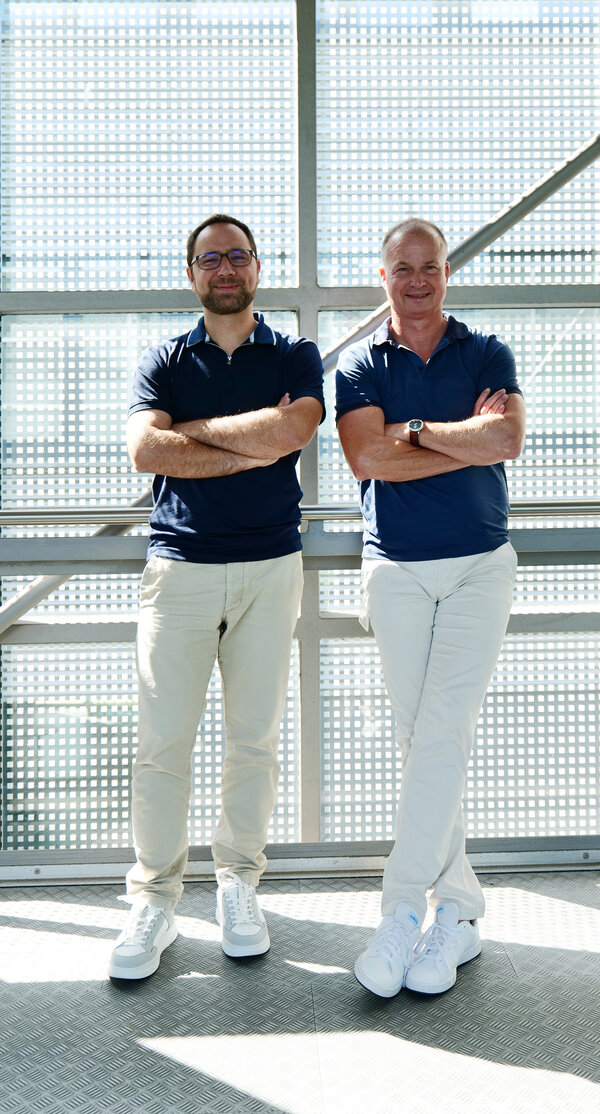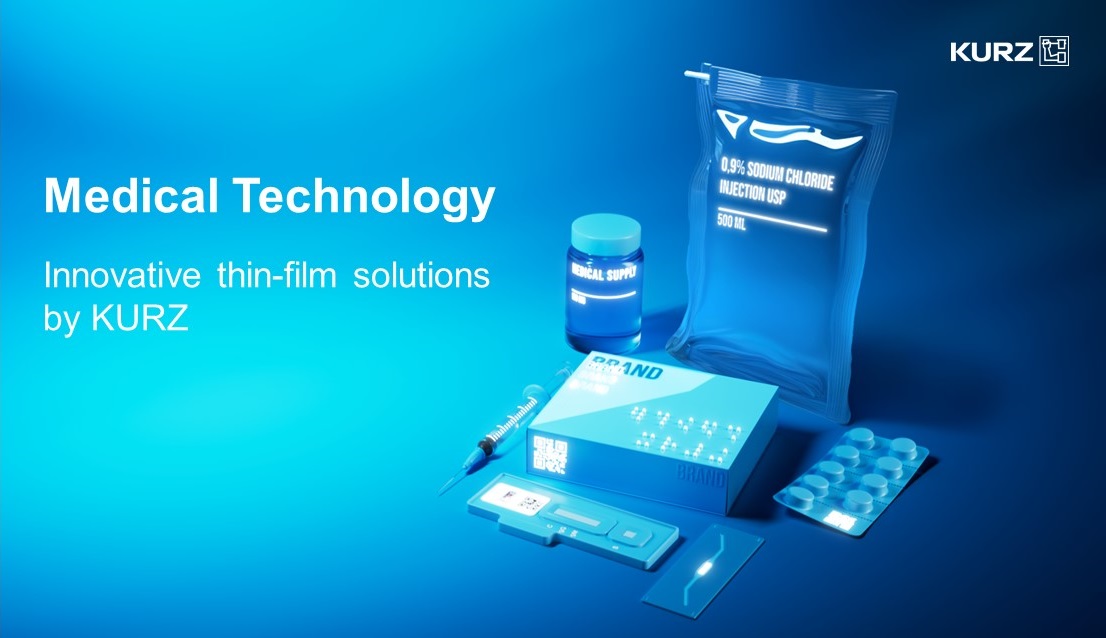LEONHARD KURZ is active in a wide variety of industries worldwide and is also a market leader - that’s well known. But did you know that KURZ has also been successful in medical technology for over 30 years? The KURZ-OROFIN editorial team talked to Dr. Dieter Pfeifle (Business Development Medical Technology) and Thorsten Schaller (Technical Head Medical Technology) to find out more about KURZ's activities in this sector. In an exciting interview, the two talk about what KURZ has achieved so far, where the journey is heading in the future, and how the industry is addressing the topic of sustainability.
Thorsten Schaller: “The range of products is very wide. It all started with the printing on transfusion bags, which we still do today. Furthermore, the application of scaling on insulin pens is one possible use that many have likely already seen. And our subsidiary PolyIC has successfully introduced a flexible sensor to the market, which is now used in state-of-the-art CT scanners. Our product portfolio is also being expanded with functional films that form flow channels with a replicated 3D structure that can be used in diagnostics. We are also well equipped for digital tasks with TRUSTCONCEPT®, SCRIBOS, and KURZ DIGITAL, to name just a few departments that have specialized in this field. Well-known systems for track-and-trace or product protection can be deployed here. Our range is complemented by the design of custom-made machines from our subsidiary BAIER and tools such as embossing stamps from H+M. For example, Braille can be added to packaging.”
Dr. Dieter Pfeifle: “Often, we first have to inform new customers about the possibilities that our film technologies make possible. Many medical technology customers are familiar with markings via transfer films. But the fact that films can do much more must first be communicated to the customer. This often results in completely new products that lead to resource savings, such as the reduction of thermoplastic material, the avoidance of wet chemical surface modifications, or the reduction of single-use products.”

Thorsten Schaller: "As already mentioned, the medical technology sector is large. If we limit ourselves to the functional field, the team has approximately 10–12 members and is spread across several locations. For about two years, Dr. Dieter Pfeifle has been on board as the Business Development Manager to further expand the area. I took over the interface between customers and our internal departments in 2022 as Technical Head Medical Technology. Previously, I had been supporting the medical technology segment as a project manager since 2018. Of course, the R&D colleagues are also part of the team. Since new processes are also necessary to serve new brands, support from process development is a must. The boundaries are difficult to define, as support for project inquiries is also needed from other business areas and subsidiaries, and contacts are available here as well.”
Dr. Dieter Pfeifle: “Medical technology is crisis-proof, and the COVID-19 pandemic in particular has shown how important medical technology is for humanity.”
Thorsten Schaller: “We have been working in medical technology for around 30 years. We aim to expand this area significantly and are looking for new markets for our replicated films. Here we see great potential to optimize the existing processes in the market and find new applications. For example, the use of films with injection-molded parts creates new technologies that further advance the miniaturization of IVD chips, which ultimately saves resources. It’s important not to rest on our laurels but to think about other possible uses. KURZ’s strategic decision to look at new markets, such as concrete applications or battery developments, is a necessary and effective decision. This keeps us innovative and, ultimately, attractive to new employees.”
Dr. Dieter Pfeifle: “Like all companies, KURZ faces intense competition every day. Agility is therefore very important in order to remain competitive. A broad product portfolio is necessary to compensate for temporary sales weaknesses in one field by increasing sales in other fields. Medical technology has been showing steady sales growth for years, and Germany, in particular, is at the forefront of innovation with around 12,000 patent applications per year.”
Thorsten Schaller: “Like any company, KURZ has to grow and also needs new markets to do so. This will help KURZ to remain an attractive employer in the future in light of the emerging saturation in some of the existing business areas.”
Dr. Dieter Pfeifle: “That’s crystal-clear: With our unique selling points in the film segment! These can include marking products and the necessary technologies for them, smart surfaces, and of course, microstructured films that can lead to significant resource savings.”
Thorsten Schaller: “With its extremely large network of all subsidiaries, KURZ has a very diverse expertise, allowing it to respond to customer inquiries in a tailored manner. KURZ is not a supplier of standard products but rather of custom developments. Roll-to-roll applications are not yet widespread in medical technology. This makes upscaling much easier.”
Dr. Dieter Pfeifle: “KURZ often makes advance investments for the customer. They often come up with an idea. The agile R&D team uses the customer’s ideas to quickly generate samples and turn them into a project. The customer’s direct contact with our R&D team is especially important here. This approach is particularly significant in the field of medical technology in order to build trust with new customers.”
Thorsten Schaller: “KURZ also has a lot of knowledge about how surfaces are functionalized. This can be done by gravure printing, replication, or even vapor deposition. For example, we have repeated requests where the customer needs hydrophilic or hydrophobic surfaces to influence the flow of fluid in an analytical chip. We can offer different solutions here.”
Dr. Dieter Pfeifle: "KURZ now acts as a one-stop shop for the customer! Everything is offered from a single source, from the provision of ideas to the finished product, which the customer only needs to apply, including, for instance, in diagnostics where thermoplastic material or glass parts are replaced by structured foil. Confidential handling of project data is very important in medical technology. This is where KURZ can benefit from its history in the high-security sector and build trust with new customers.”
Thorsten Schaller: “By pooling our expertise, we can respond to customer inquiries even better and faster, ensuring that not just a single component comes from KURZ, but potentially an entire system.”
Dr. Dieter Pfeifle: “Unfortunately, we can’t report on our many customer projects as we’ve signed many non-disclosure agreements. However, 30 years of experience in the medical technology field have brought KURZ many renowned references in pharma, med-tech, and life sciences.”
Thorsten Schaller: “We are working on several project requests for completely different applications. The goal is to bring projects to industrial implementation as quickly as possible, not just to work on development projects. Ideally, there is a project that can also be officially advertised. The developments so far are all subject to non-disclosure agreements.”
Thorsten Schaller: “Sustainability is of course a major topic everywhere. However, when talking about medical technology applications, the recyclability of products is difficult to implement because they may involve contaminated materials. The use of recycled materials in diagnostics is also not yet common and not widely adopted. However, we are taking the path of miniaturization, so that significantly fewer substances need to be used, leading to considerable resource savings.”
Dr. Dieter Pfeifle: “By replacing thermoplastic parts and glass with structured film, the customer can save significant resources. Miniaturization leads to a significantly reduced use of very expensive bio-reagents (such as costly antibodies), resulting in substantial savings for both the customer and the consumer, i.e., the patients.”
Dr. Dieter Pfeifle: “As a hidden champion, KURZ is not yet as well-known in the medical technology sector. Feel free to contact us and get to know our work processes through an initial project.”

Feel free to visit our website Medical Technology by KURZ (kurz-medical.com).
You're in the right place! Just drop us a message. How can we help?